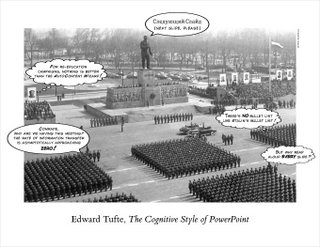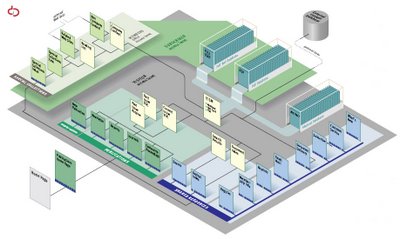Quaero's 'stunningly ambitious' technological goals
That’s what The Economist wrote on March 9, 2006 in an article heading:” Search technology: Can an ambitious new European search engine, backed by the governments of France and Germany, challenge Google?”
On various blogs people discuss Quaero, so do I. A great many of them state that the way Quaero will compete (as if) with Google and Yahoo! is unfair, since the French and German governments are pumping enormous funds into the collaborative economic effort in the image of the success of Airbus. Well, so what! Isn’t the American software industry built upon the previous investments of its governmental projects like DARPA and NASA? Google being a private company today, doesn’t mean it did ever profit from governmental funds, didn’t Page and Brin study at Stanford, and doesn’t Stanford still hold the patents on the ranking mechanism… I rest my case.
Far more interesting than French/German – American competition, is the scientific side of Quaero, that is: investing in building a new body of knowledge about multimedia retrieval. Really pushing the envelope of information retrieval by developing new technology to be able to incorporate other than text-based search mechanisms.
 Searching by example, with an image as example! One of the french project partners called LTU Technology is already working on it quite some time, now they have the opportunity to get to the next level. And so does the German research team at the university of Karlsruhe, working on speech-based algorithms. The latter are focussed on speech-based retrieval.
Furthermore, think of the massive impact on the multiliguality of the web by propagating keywords. Say two images match based on image properties, the one has english metadata the other french metadata, through propagation of these metadata onto eachother (in the index) both pictures will become retrievable in both languages. That’s kick-ass innovation.
Let’s give Quaero a chance. Luckily Mrs. Merkell backs the initiative of her predecessor Schroeder, so politics didn’t get in the way during the german government’s transition. Let the researchers do their work, don’t let Quaero get in harms way before something is actually built. It’s not about competing, it’s about a next leap in retrieval, multi media retrieval!
PS Quaero has one advantage on Google and alike, it doesn’t have difficult business models underneath, just like Google when it was still a project at Stanford some ten years ago being nurtured by ambitious students called Larry Page and Sergey Brin.
Searching by example, with an image as example! One of the french project partners called LTU Technology is already working on it quite some time, now they have the opportunity to get to the next level. And so does the German research team at the university of Karlsruhe, working on speech-based algorithms. The latter are focussed on speech-based retrieval.
Furthermore, think of the massive impact on the multiliguality of the web by propagating keywords. Say two images match based on image properties, the one has english metadata the other french metadata, through propagation of these metadata onto eachother (in the index) both pictures will become retrievable in both languages. That’s kick-ass innovation.
Let’s give Quaero a chance. Luckily Mrs. Merkell backs the initiative of her predecessor Schroeder, so politics didn’t get in the way during the german government’s transition. Let the researchers do their work, don’t let Quaero get in harms way before something is actually built. It’s not about competing, it’s about a next leap in retrieval, multi media retrieval!
PS Quaero has one advantage on Google and alike, it doesn’t have difficult business models underneath, just like Google when it was still a project at Stanford some ten years ago being nurtured by ambitious students called Larry Page and Sergey Brin.






